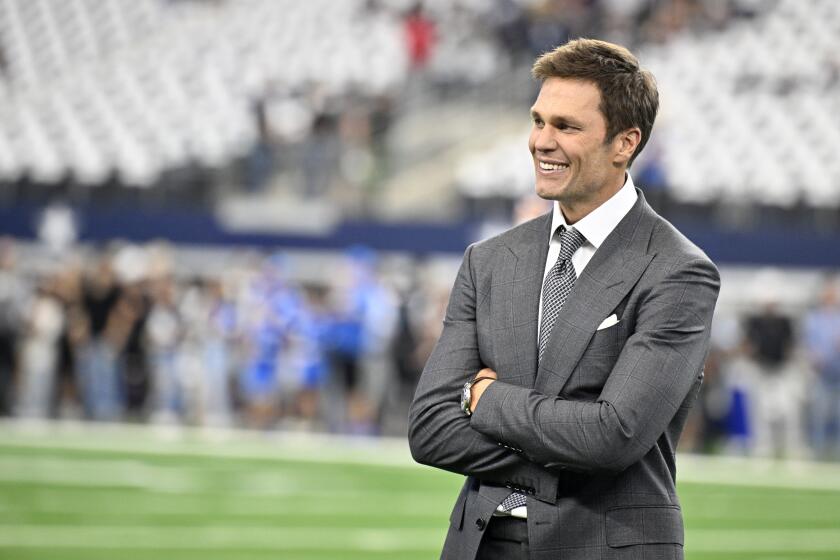Mets’ Life With Johnson Not Easy, but Very Successful
HOUSTON — There is more to it than scribbling nine names on a lineup card and shifting divots of tobacco from cheek to cheek. A manager has to learn how to get the most out of a baseball player, how best to tap his natural resources, whether it be by providing the friendly persuasion of a mommy or by barking insults like a drill sergeant. Caress or duress. Whatever it takes.
Eddie Mathews must have been weighing those options the night he was trying to decide what to do about one of his infielders, Davey Johnson, whose success at launching the ball out of Atlanta’s pad appeared to be going to his head. A homer hitter was something Mathews needed, but a malcontent was something he did not. Johnson had to realize who was running this club.
It boiled over one 1973 summer’s evening at a Philadelphia hotel, when Johnson, believing that his manager had reneged on a promise to give him a one-game rest, returned to his room to sulk. Mike Lum had the bad luck to have forgotten his key, and the worse luck not to have noticed the do-not-disturb signs in Johnson’s eyes when Davey finally answered the knock on the door.
Feigning anger at being kept waiting in the hall, Lum whisked past Johnson into the room with a playful push. Johnson responded with a not-in-the-least playful left hook. By the time the men were separated, the Braves already were busy making arrangements to lock their brooding second baseman in pitcher Phil Niekro’s room for the rest of the night and throw away the key.
Johnson got angrier. He was being treated like a child. So, he escaped through a window, contacted the front desk and requested a room of his own, on his own money. But the hotel manager snitched to the ballclub manager, and Mathews intercepted Johnson upstairs. They quarreled, whereupon Mathews chose a new tack. Forget who’s boss around here, he said. “Hit me.”
“Eddie, you’re the manager. I’m not going to hit you,” Johnson said.
“Come on,” Mathews dared him. “Forget that. Man to man. Let’s get it off our chests. Hit me.”
It is at this point that the wise old manager--or drill sergeant or whatever--blocks the younger man’s wild swing with his arm, pops the kid in the chops, then helps him up from the rug, dusting his back. And let this be a lesson to you, son.
Reality occasionally interrupts such fables, however, which more or less accounts for what happened when Johnson reached back for a punch that came from Nastyville and sent his manager wobbling across the bedspread.
Possibly the fighting spirit of today’s New York Mets can be traced to nights like this. Talk to one player, Ron Darling, say, and he might tell you about the time his manager called him chicken and dared him to pitch better, treated him like a kid. Talk to another, Ray Knight, and his version will be how sensibly his manager cajoled good performances out of players who needed some sort of motivation in the worst way.
Their manager is Davey Johnson, 43, who went to the whip more than once in riding the Mets to the best record any baseball team has had in many years.
Johnson was gentle with some, rough with others. In many ways he re-enacted what he had learned at the sleeve of Baltimore’s Earl Weaver, who got on Jim Palmer’s case just the way Johnson got on Darling’s, and in similar ways he took a cue from Tom Chandler, his college coach at Texas A&M;, who responded to Johnson’s threats to leave the team by telling him if he was going to quit now, he would be a quitter all his life. Next day, Johnson was back on the field and hustling.
Guidance was all some players needed, and Johnson gave that to the Mets. “He’s the best I’ve seen at handling young players,” first baseman Keith Hernandez said. “He’s head and shoulders above everyone else.”
The National League East champions have come to trust Johnson’s instincts. When he is blunt with one of them, they suspect he is being fair. When he puts aside the computer he consults for advice and goes with a gut feeling, yelling his head off at somebody, it has tended to leave an imprint on these players, some of whom, Knight and Lenny Dykstra for instance, have demonstrated on the field their willingness to take a sock at anyone who stands in their way. The Mets had had a cavalcade of managers, nice guys all, before Johnson came along, and of the 10 of them, only one, Gil Hodges, ended his employment with them with a winning record. Johnson, the get-tough guy, has managed the Mets for three seasons and has never won fewer than 90 games.
He brought to the job what some would call arrogance and some would call assurance. Upon being given the job by the Mets’ general manager, Johnson crowed: “I congratulate Frank Cashen on hiring me. It’s about time.”
Of the club he inherited, Johnson wrote in a book about the 1985 season, the Mets “were in absolute shambles . . . they hadn’t even been interesting or fun to watch.”
George Bamberger and Frank Howard, his predecessors, were too nice and too inclined to waste time with veterans instead of giving chances to prospects, assessed Johnson, who had never managed in the majors before being hired by the Mets.
“I was sure that if anybody could turn the Mets around, I could,” he wrote.
As a player, Johnson required the very sort of motivation that he one day would give to players of his own. He was a volatile individual, capable of 43 home runs in that 1973 season under Mathews, most in one season by a second baseman, but uninspired enough that he collected only 93 other homers during the rest of his 13-year career.
He played alongside Hank Aaron in Atlanta and Sadaharu Oh in Tokyo, and all the while he eavesdropped on his managers, seeing how they handled the talent. It became clear to him that bad management could bring good teams down. Weaver tried to tell him that players win games and managers lose them. He filed this information away.
“It’s like being an interior designer,” he said. “You get ideas from a lot of people, but, in the end, you wind up doing what you like.”
So, when he finally got a team of his own, he asked a lot of his people. When infielder Wally Backman was badly injured before a big game last season with St. Louis, possibly even with a broken ankle, Johnson told Backman to forget having X-rays and get out there and play. He took players whose careers were in decline, Knight and Bob Ojeda and Jesse Orosco, and challenged their desire to win. Knight went out and hit .298 this season, winning the third base job. Ojeda went 18-5, and Orosco saved 20 games.
“It seems like every move he makes is the right move,” said Knight. “It’s amazing. I have yet to see him do something that has backfired on him.”
Methods can be questioned, but not results. Manager Whitey Herzog of the St. Louis Cardinals took glee, recently, in chiding Johnson for making it sound in his book, “Bats,” as if Johnson had invented the game of baseball. Yet, in three seasons as a manager in the minors, Johnson won three championships. And no National League manager has ever won so many games in his first three years.
“I’m very satisfied with the progress we’ve made so far,” Johnson said. “I take pride in squeezing a little extra out of one player, or in motivating another to do his best. Some guys only need a little nudge. Someone like Ray Knight, the object is to detect his talent level and determine why he hasn’t been playing up to it. My aim in this job is to bring out the best in people.”
And if it means getting tough with those people?
“Hey, you do what you have to do,” he said.
Unless you find one who is even tougher than you are, in which case, you duck.
More to Read
Go beyond the scoreboard
Get the latest on L.A.'s teams in the daily Sports Report newsletter.
You may occasionally receive promotional content from the Los Angeles Times.










